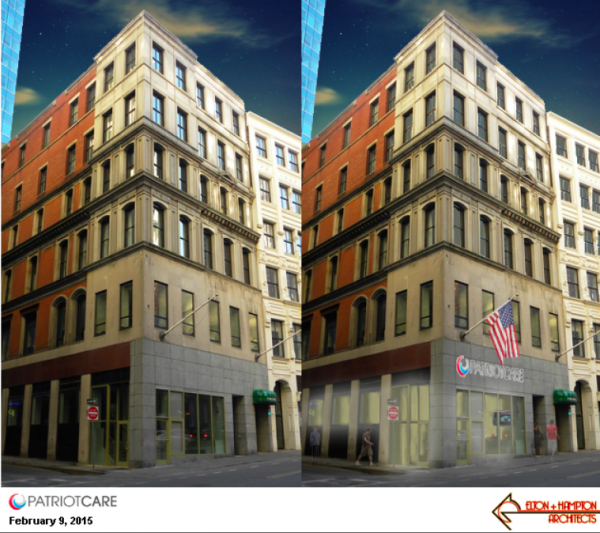May 14, 2015

A rendering of Patriot Care's facility at 21 Milk Street. Photo courtesy Patriot Care
The group behind Boston’s first medical marijuana dispensary is preparing to clear what they call their final obstacle before opening: an appearance before the city’s Zoning Board of Appeals on June 2. Patriot Care, already the only licensed dispensary in Suffolk County, hopes to open at 21 Milk St. by the end of the year.
Massachusetts voters approved a ballot measure to legalize medical marijuana in 2012 and since receiving its license from the state last November, Patriot Care has worked to hone its pitch to finally open its Downtown Crossing dispensary’s doors to customers.
“We’re talking to as many people as we can,” said Patriot Care CEO Bob Mayerson, including abutting neighborhood groups in Downtown Crossing and city officials. Once such city official has been Dorchester’s district City Councillor Frank Baker, who toured the company’s affiliated operations in Washington, D.C. in April.
Baker and Mayerson agree that while the dispensary is in Downtown Crossing, its location at the locus of the city’s subway and bus services means easily access for patients in Dorchester and Mattapan–and beyond.
“We feel that Dorchester is a very important area for us,” Mayerson told the Reporter in an interview last week. “There is a tremendous amount of veterans in Dorchester: Iraq, Desert Storm, Vietnam, and many of them are suffering from PTSD and various other ailments related to military service. We have a number of strains that address these particular issues.”
Though the dispensary is not located in Baker’s district, he and other council members are hoping to tackle the issue head-on.
After touring Patriot Care’s affiliate facility in Washington D.C., Baker told the Reporter the facility’s exterior was “nondescript with tight security,” but the inside “looked like a doctor’s office or a spa.” In addition to medical marijuana dispensary Capital Care in DC, where marijuana was legalized in February, the company also has affiliated locations in Chicago.
“These guys seem like good operators,” Baker added.
Though officials initially predicted the state’s medical marijuana dispensaries would be open last summer, the city defends the pace of their work with Patriot Care.
“They’re the first one so we’re going to do our due diligence and make sure that they follow our process to a T,” said Leon Bethune, the director of environmental and occupational health for the Boston Public Health Commission (BPHC). Those steps include getting permissions from the ZBA before BPHC begins its permitting process. “That’s why it’s taken so long for these things to be up and running,” Bethune told the Reporter last week. “It’s not a free-for-all.”
“Whatever the original intent of the ballot initiative, it takes longer to do these things when it’s the first time,” said Mayerson. The company’s website says the Boston location, as well as Patriot’s two other locations in Lowell and Greenfield, will open this summer.
Mayerson, Baker, and the BPHC are careful to note that the dispensary, though it will be easily accessible by mass transit, will not be a place for casual buyers to walk in off the street and easily access the product.
“People think it will be a storefront with marijuana leaves,” Myerson said. “When you walk by our location, you won’t know there’s a dispensary unless you already know. And that’s the way we like it.”
Customers must be have proper identification and certifications from a doctor and the state to even get into the building. And those looking into the building’s windows will only see the desks and office space of Patriot Care’s employees.
“These things are highly secure. Some ‘Joe Schmoe’ off the street can’t just walk in,” said Bethune.
After Patriot Care was awarded the license in November, Action For Boston Community Development (ABCD) President and CEO John Drew made headlines by pushing back against the dispensary, saying its proximity to a nearby ABCD-run recovery high school and other facilities would cause an “immediate threat to some of our city’s most vulnerable populations.”
Once Patriot Care wins the real estate approvals with the city, the company will do a “complete build-out” of the Milk Street location, including creating curb cuts on the street for handicap accessibility, said Dennis Kunian, a spokesman for Patriot Care. He did not have an estimated dollar amount for the renovation.
“This location, at 21 Milk, will forever-more be medical only,” said Kunian.
In March, At-Large City Councillor Michael Flaherty filed an order with the City Council to maintain a 2,500-foot distance between medical marijuana dispensaries, seeking to prevent dispensaries from being clustered in certain pockets of the city. Baker called the proposal “a way for us to get a handle on it,” from the city’s perspective.
Should another dispensary come to Boston’s Suffolk County–the county is allowed up to five medical marijuana dispensaries–Baker said he is hesitant about supporting one in Dorchester.
“I don’t think I would want a marijuana clinic in my district,” Baker said, adding “but I’d rather marijuana than a methadone clinic.”
As the city grapples with medical marijuana, it is also readying for a potential statewide push to legalize marijuana in 2016.
At the Boston Public Health Commission, that means back to the drawing board for the city’s policy.
“If that happens, we’ll have to figure it out on our end on what to do,” Bethune said. “Our regulations are around medical marijuana.”
Baker said he has no stance yet on legalizing marijuana.
“I think it starts with medicinal and we’ll see how that goes.”



